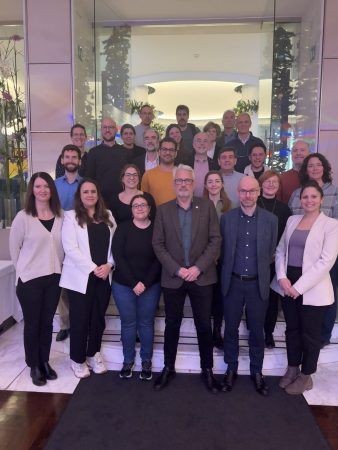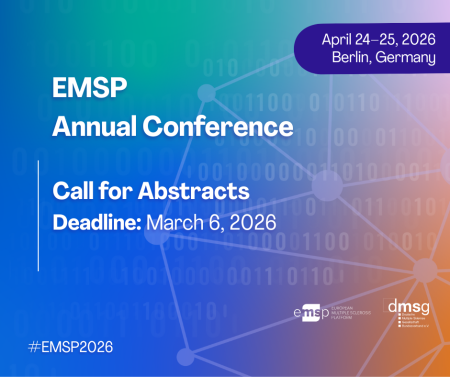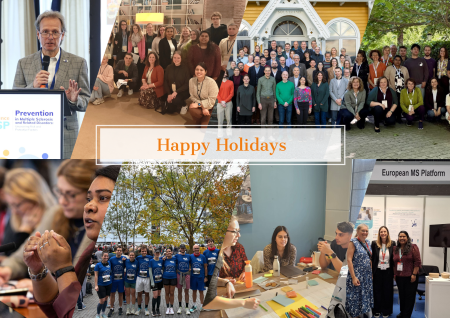
Reflecting on Progress: The EBV-MS Annual Consortium Meeting 2024
30.11.2024On November 25th and 26th, the picturesque city of Rome played host to the Annual Consortium Meeting of the EBV-MS Project, where experts from across Europe and the USA gathered to discuss the progress of our groundbreaking research into the link between Epstein-Barr virus (EBV) and Multiple Sclerosis (MS).
Understanding the EBV-MS Connection
The EBV-MS Project is an EU-funded research initiative aimed at uncovering the role of the EBV in the onset and progression of MS. Building on pivotal 2022 research published in Science, which demonstrated that EBV infection greatly increases the risk of developing MS, this project seeks to answer critical questions about why only a small fraction of EBV-infected individuals develop MS. With more than 95% of the global population exposed to EBV, but only 0.2–0.3% developing MS, the project is investigating the mechanisms behind this process and exploring whether targeting EBV with antiviral treatments can alter the disease course or prevent its progression.
By combining expertise from leading universities and hospitals across Europe and the USA, the project has ambitious objectives, including conducting clinical trials with antivirals, identifying immune cell signatures associated with EBV infection, and using machine learning to predict and prevent MS. Ultimately, the initiative strives to transform how we understand and treat this complex and debilitating condition.
EBV-MS consortium members at the Annual Meeting in Rome, Italy.
Day 1: Collaborative Insights and Exploration
The first day began with administrative discussions, setting the tone for a well-structured meeting. Financial and scientific reporting processes were reviewed, timelines were aligned, and responsibilities clarified. The morning also included preparations for the Scientific Advisory Board (SAB) review, emphasising the importance of accountability and scientific rigor.
The focus then shifted to the Clinical Trials and Immunology work packages, where updates were shared on the latest findings and the progress of trials aimed at understanding how EBV drives immune responses in MS. These sessions underscored the consortium’s commitment to translational research that bridges the lab bench and the patient bedside.
In the afternoon, the spotlight turned to Epidemiology, Genetics, and Artificial Intelligence (AI). Discussions highlighted how AI and advanced analytics are being harnessed to uncover patterns and predictions in EBV-related MS research. As the day progressed, the Data Management session underscored the importance of structured, accessible, and secure data in this large-scale project.
A key moment in the meeting was the participation of BEHIND-MS representatives, who were present throughout the discussions and also presented virtually. Both the EBV-MS and BEHIND-MS teams emphasised the importance of aligning efforts now and in the future, looking for synergies and opportunities for collaboration. The BEHIND-MS project was showcased as part of these ongoing efforts, and the teams discussed how coordinated actions can amplify the impact of both initiatives. This collaboration ensures that both projects are not only scientifically robust but also deeply connected to the needs of the MS community.
The evening brought an opportunity for informal networking and cultural immersion with a walking tour through Rome’s historic streets, culminating in a group dinner that fostered connection among the team.
Day 2: Feedback and Future Directions
The second day began with reserved time for separate discussions, allowing focused conversations on specific work packages and partnerships. Feedback from the SAB was presented, with detailed, actionable points that will guide the consortium’s strategy in the months ahead.
A key highlight of the morning was the Engagement Coordination Team (ECT) session, which focused on planning the materiality analysis for stakeholder engagement. The team explored strategies to meaningfully involve stakeholders, including researchers, clinicians, policymakers, and patient advocacy groups, in shaping the project’s direction. This session emphasised the importance of co-creation and ensuring that the voices of all stakeholders are integrated into the project’s activities and outputs. By fostering engagement, the consortium aims to maximise the project’s impact and relevance for the MS community.
Later in the day, the session on Communication and Dissemination outlined strategies to share the project’s findings with the broader scientific community and engage key stakeholders further. The session also highlighted the importance of tailoring communication strategies to engage diverse audiences, ensuring that both scientific and patient communities benefit from the project’s findings.
The meeting concluded with a Steering Committee Meeting, discussing upcoming action plans. These final hours ensured alignment across all work streams and prepared the consortium for the next phases of this ambitious project.
Looking Ahead
As the meeting wrapped up, it was clear that the EBV-MS Consortium is making significant strides in understanding the role of Epstein-Barr virus in multiple sclerosis. By fostering collaboration across disciplines, the project is paving the way for innovative therapies and preventive strategies that could transform the lives of people affected by MS.
With refreshed energy and clear action points, the consortium moves forward, committed to delivering impactful outcomes that advance MS research and patient care.
Stay tuned for more updates as we continue this journey of discovery: https://www.uib.no/en/ebvms
This project has received funding from the European Union’s Horizon Europe Research and Innovation Actions under grant no. 101136991 (EBV-MS). Funded by the European Union. Views and opinions expressed are however those of the author(s) only and do not necessarily reflect those of the European Union or the Health and Digital Executive Agency. Neither the European Union nor the granting authority can be held responsible for them.

 Your Account
Your Account


